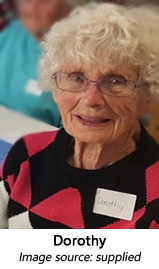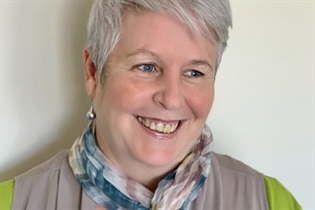'Dying to talk' death cafes spark end of life care conversations in aged care
A guest blog post by Kathleen Wurth, Palliative Care Clinical Nurse Consultant, Palliative Care, Port Kembla
As a palliative care nurse, I was involved as a stakeholder with Multicultural Village Aged Care Illawarra (MACI) at Warrawong, NSW participating in the ELDAC Linkages program.
We introduced an afternoon tea to provide opportunities for small discussions on choices, wishes and living well with residents. As a start, we invited a few residents and held what would become our first ‘Dying to Know Café’ in a residential aged care facility. A resident called Dorothy inspired us to try the idea when she mentioned she had difficulty hearing information at our community forum about advance care planning. We decided on a smaller more personal approach to try out.
An afternoon tea was enthusiastically organised with declicious melting moments and tea cups and we talked about what we hoped would happen as we approach our dying time. Dorothy was calm and wise in her conversation and had obviously thought about this before. Dorothy said she hoped to die at MACI with her family present and with hymns playing. The team spoke to Dorothy’s son, and they talked through Dorothy’s advance care planning revisions. Everyone was on the same page including the GP.

A few months later, Dorothy had a change in health and was admitted to hospital. Her advance care directive was clear and respected. Dorothy returned to MACI with the biggest smile on her face and said, “I am home.”
The staff were ready to use their skills and expertise and felt confident in supporting Dorothy, and she was relieved and thrilled to be back at MACI - her home. Generations of her family visited and spent time, having cuppas and keeping her company. Dorothy also wanted her MACI family to be around her. We followed her wishes and residents, kitchen staff, cleaning, administration and care staff said their goodbyes and were able to comfort Dorothy. She was delighted that everyone came to spend time with her. She had no fear facing her end and was at peace. Dorothy died listening to her favourite hymns snuggled in her own bed. I am told it was magical.
Since then, other residents have reviewed their own advance care plans and one resident has written his own eulogy. Several Dying to Know Cafés have also been held in other residential aged care homes and when I am sitting with people talking through their wishes and preferences, I think of Dorothy. I am so glad she was sweet and assertive enough to tell me that she didn’t hear a word I said in the first place! The smaller groups are informal, friendly and intimate. The opportunity to share and feel listened to is there. It is because of Dorothy that we understand that running Dying to Know Cafés in residential aged care homes are an effective starter to initiate conversations and provide the opportunity for people to talk about their wishes. A well facilitated supportive conversation with sharing and trust will enable these authentic conversations.
I was grateful for the ELDAC Linkages program facilitation and encouragement and inspired by the work and commitment of the MACI team to serve their residents with skill and compassion.
This blog originally appeared in the ELDAC Linkages Program case stories booklet and has been republished with permission as part of the ELDAC My Care Matters campaign.

Kathleen Wurth, Palliative Care Clinical Nurse Consultant, Palliative Care, Port Kembla